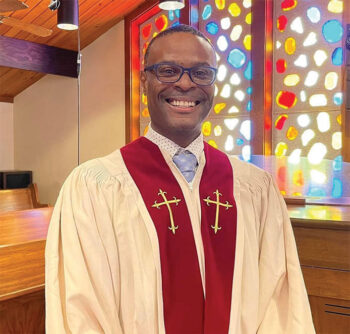 Rev. Derrick Elliott
Rev. Derrick Elliott
Last month I read a story about a forest in New Zealand. The kauri tree stump kept itself alive by holding onto the roots of its neighboring trees, exchanging water and other vital resources. If one looks at the stump, it appears to be struggling to survive or die; however, it was supported by reaching out and connecting itself with the other surrounding trees’ root system. The other trees were the support system it needed to become healthy. This has gotten me to reflect on how we, as humanity, build our connections, camaraderie, and fellowship, and how the faith community can be a resource to strengthen humanity’s relationship with others and the Creator. Since we are becoming divided in this nation and amidst the present COVID-19 pandemic, we have lost sight of restoring healthy relationships in the kingdom of God and have forgotten to see each other as the beautiful creation of God, called by God to care for one another.
We are human beings and need healthy, healing, and life-giving relationships. By observing the kauri tree, we can see the value in forming a relationship with others. Humans all have emotions, hopes, desires, dreams, and needs to be met. Building connections, camaraderie, and fellowship, are the means for humanity to create the structure from where they are or have been mentally, physically, emotionally, and spiritually fit to face life. Moreover, building a relationship with God improves one’s life. God is calling us to be in a community with each other. In the epistles of Paul, he noted that we should be rooted and established in love. Being a part of a faith community can also help to be rooted in love. God loves us; in Christ’s teachings, there is love. I once read that love gives you the power to become what you want to be. Loving people are life-givers. This is connectedness.
According to new research led by Harvard T.H. Chan School of Public Health, individuals who attended religious services at least once a week were significantly less likely to die from “deaths of despair,” including deaths related to suicide, drug overdose, and alcohol poisoning. This study was published online in JAMA Psychiatry on May 6, 2020. Most people engage in connections, camaraderie, and fellowship at the start as children, and it seems easier for us to make those connections, camaraderie, and fellowship. However, as we get older, we tend to find it hard to build those last relationships. Attending a house of worship is one way to promote social connectedness. Remember, just like the stump in New Zealand, we also were designed to flourish in connectedness.
